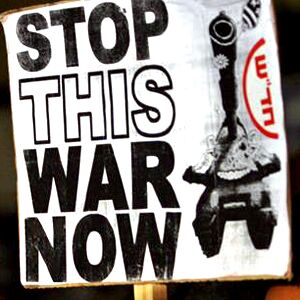
Cracks in Israeli Support of War Effort Emerge
Unity of purpose had drawn the citizens of Israel together in support of their government’s actions against Hezbollah to an extent unprecedented in recent Israeli history. Missile attacks by Hezbollah could not be tolerated; Israel must do whatever necessary to stop them. But just four weeks later—even before the UN ceasefire agreement was agreed—the strain was starting to show.
Even in the midst of continued barrages by Hezbollah missiles, a portion of the Israeli populace, it seemed, was ready to cave.
Associated Press reported last Thursday:
The first cracks in Israeli support for the war in Lebanon emerged Thursday, with leading intellectuals and mainstream politicians criticizing the government’s decision to send more soldiers into Hezbollah territory.
Every Friday for a month, antiwar activists have demonstrated against Israel’s retaliation for Hezbollah’s July 12 cross-border raid, but they never drew more than a handful of people. Opinion polls showed backing for the war at about 80 percent. But some peace activists who had remained quiet or even supported the fighting now say it has gone on long enough. Three of Israel’s most successful authors and intellectuals—Amos Oz, David Grossman and A.B. Yehoshua—on Thursday urged Prime Minister Ehud Olmert to focus on diplomatic rather than military initiatives. … The nascent turnabout came after Olmert’s Security Cabinet voted Wednesday to extend the ground offensive to the Litani River, 18 miles from the Israeli border. … About 600 people attended a rally in Tel Aviv on Thursday. Though small compared with the tens of thousands who protested Israel’s invasion of Lebanon in 1982, it marked a revival of Israel’s dormant peace movement.
The Israelis have a history of being tough and patriotic and, even still, they have shown a rare solidarity (especially when contrasted with most Western nations) in the face of terrorism. But they are growing weary. With casualties mounting and the Israeli Defense Forces appearing to make few strategic gains, “the seed of discontent is growing over the army’s failure to dislodge Hezbollah and stop the hail of rockets on northern Israel” (emphasis ours).
Weariness will give way to hopelessness. Already, said AP, “doubts have been growing about whether Hezbollah can be destroyed, as Israel set out to do a month ago.”
“We are getting lost in pursuit of a victory that is not there,” wrote mainstream columnist Nahum Barnea in the Yediot Aharonot daily. “There is no point investing in a lost cause,” Barnea wrote, urging Olmert to “take what they’re offering you … and run.”
It appears this could be exactly what the Israeli cabinet has done in approving the UN Security Council resolution calling for an end to the fighting. Whether the ceasefire actually comes into effect—and holds—is uncertain. But in any case, it is likely that schisms within the State of Israel will become further pronounced in the coming days and weeks, which would erode the popular mandate Olmert’s government has had to pursue military action against Hezbollah.
In the face of adverse world opinion and weakening support at home, Olmert has already backed off his goal to destroy Hezbollah. What does this portend for the future of Israel? Read “Israel’s Final Chapter” to find out.
